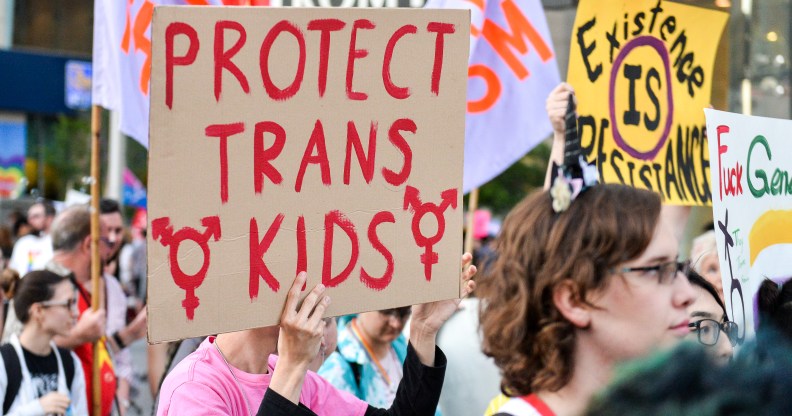No, there’s no such thing as ‘rapid onset gender dysphoria’

(Anatoliy Cherkasov/SOPA Images/LightRocket via Getty)
Australian experts have debunked ‘rapid onset gender dysphoria’ in a strongly-worded position statement.
The phrase emerged in 2018 and posits that a “social and peer contagion” is responsible for young people identifying as trans, as opposed to growing acceptance and understanding.
‘Rapid onset gender dysphoria’ is used by some journalists and online activists to suggest that trans teenagers, particularly teenage trans boys, are not trans but lesbians or girls with mental-health problems who – usually in “clusters” – declare themselves to be trans boys “after exposure with their peers to suggestions they are ‘trapped in the wrong body'”.
Reiterating that the phrase comes from a single 2018 study and that there is no reliable evidence that it exists, the Australian Professional Association for Trans Health (AusPATH) said it does not recognise ROGD – and neither does any other major health organisation.
“The term ‘rapid onset gender dysphoria’ is not, and has never been, a diagnosis or health condition but has been used in a single report describing parental perception of their adolescent’s gender identity without exploration of the gender identity and experiences of the adolescents themselves,” AusPATH said.
“The term ‘rapid onset gender dysphoria (ROGD)’ is not a diagnosis or health condition recognised by any major professional association, nor is it listed as a subtype or classification in the Diagnostic and Statistical Manual of Mental Disorders (DSM) or International Classification of Diseases (ICD). Therefore, ‘ROGD’ is an acronym describing a proposed phenomenon, with insufficient peer-reviewed scientific evidence to support its implementation and/or use within clinical, community, social and legal settings.”
Lisa Littman of Brown University authored the study that first reported ROGD, which was published in the journal PLOS One in August 2018. Within a week, following criticism of the study, the journal announced it would conduct a post-publication reassessment of the article.
A revised version of the article was subsequently republished, along with an apology from the editor-in-chief of PLOS One that read: “We conducted a formal review of the study and have made the decision to issue a correction of the original article. I would also like to apologise in particular to the trans and gender variant community for oversights that occurred during the original assessment of the study.”
“As with all cases involving significant corrections to the published record, we have not taken this decision lightly, and do appreciate that there are different viewpoints about the study. In our view, the corrected article now provides a better context of the work, as a report of parental observations, but not a clinically validated phenomenon or a diagnostic guideline.”
In April 2019, another Brown University academic published a report in journal the Archives of Sexual Behaviour criticising Littman’s methodology.
AusPATH’s position statement follows the Australian Psychological Society, which has also rejected claims of a “social contagion” turning children trans as “alarmist and scientifically incorrect”.
In a September 4 statement, APS said, “Empirical evidence consistently refutes claims that a child’s or adolescent’s gender can be ‘directed’ by peer group pressure or media influence, as a form of ‘social contagion’.”
“To say that there is a trans-identity crisis among young Australians because of social media pressure is not only alarmist, scientifically incorrect and confusing, but is potentially harmful to a young person’s mental health and wellbeing.”

